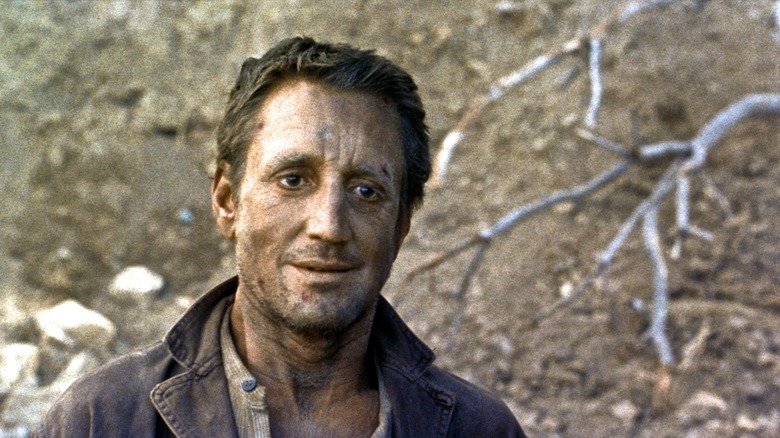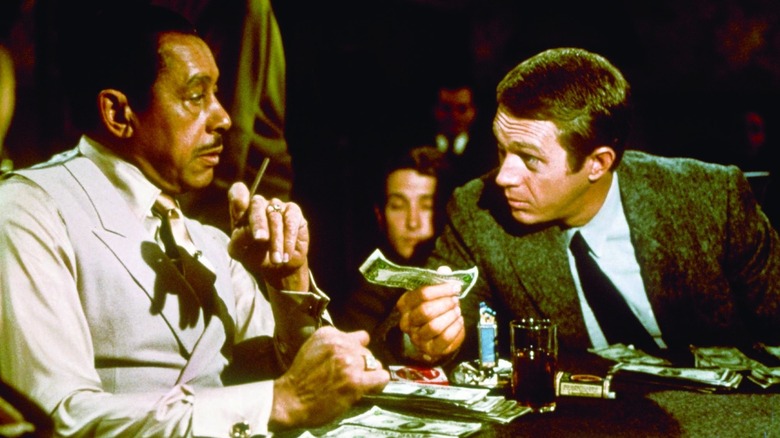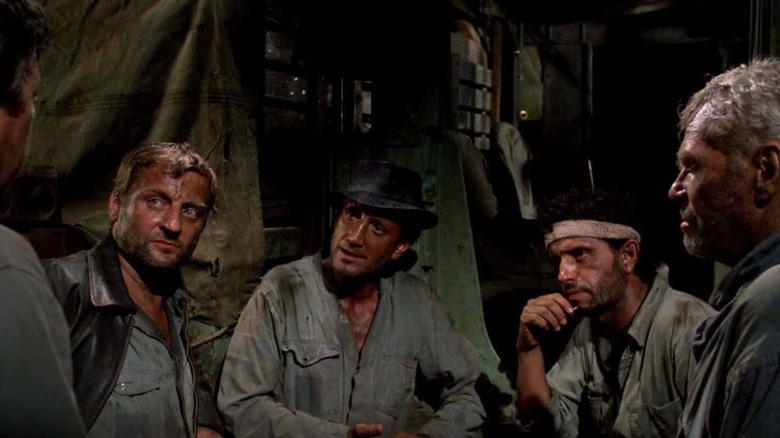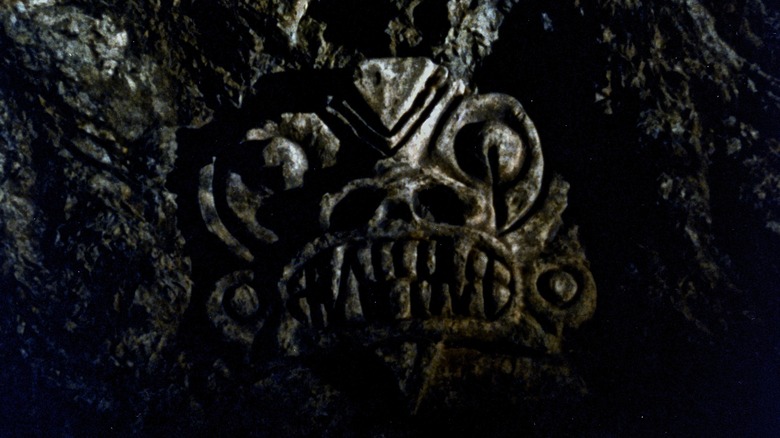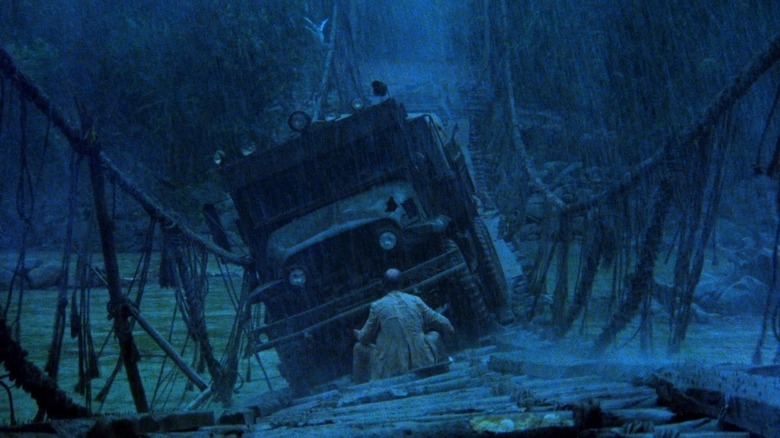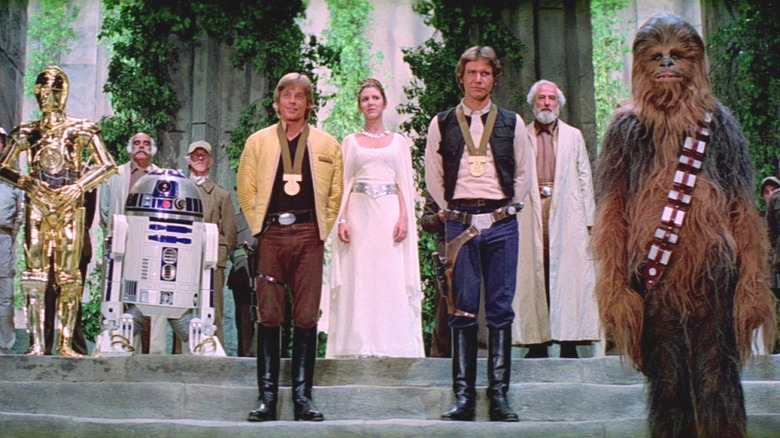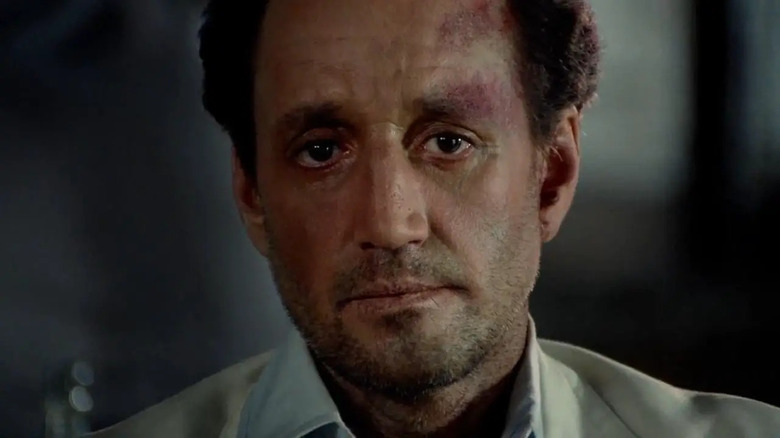A Perfect Storm Of Problems Led To The Failure Of William Friedkin's Sorcerer
There's a pearl of colloquial wisdom in filmmaking that basically claims that a movie will end up the opposite of the way it gets made. For instance, a really delightful comedy will be a tense chore to make, a dark and disturbing horror picture will have a light set full of laughs, a great movie will emerge from a fraught and dangerous working environment, and a film that everyone has a fun time working on will end up being unwatchable and bland.
Of course, there are exceptions to every general rule. Some films that seem doomed from the start turn out to be failures, and the only reason the filmmakers didn't acknowledge the omens and warning signs is because of their mad determination and foolish belief that a pot of gold is waiting at the end of a dark rainbow.
1977's "Sorcerer" is one of these films, a movie that was born under a bad sign, was a life-threatening chore to make, and ended up being trashed and dismissed upon release. Thanks to being an adaptation of one of the great suspense stories (Georges Arnaud's "Le Salaire de la peur"), featuring a top-notch cast, and having William Friedkin as its director, "Sorcerer" has since undergone a largely positive reappraisal in the nearly 50 years since it came out. Whether they enjoy the film or not, most people viewing the film today appreciate that they don't make 'em like they used to. Given the perfect storm of problems that plagued "Sorcerer" and its production, there's a damn good reason why they don't.
The Cincinnati kid stays out of the picture
After the worldwide success of 1973's "The Exorcist," Friedkin chose re-adapting Arnaud's 1950 novel as his next project. The story had already been made into a well-regarded movie by Henri-Georges Clouzot in 1953 entitled "The Wages of Fear." According to Friedkin's memoir, "The Friedkin Connection," the young director approached Clouzot to get the elder's blessing. During the meeting, Friedkin realized his deep desire to make the film. After enlisting writer Walon Green to pen a script, he tried to cast some big names in the leads, not the least of which was Steve McQueen, whom Green had in mind while writing. As Friedkin revealed to Deadline in 2015, however, he and the actor couldn't see eye to eye:
"We sent it to Steve and he called me and said, 'This is the best script I've ever read. I love this picture.' Then, he said, 'There are a couple of things I need you to do for me. I know you want to go out to some jungle and shoot it and I can't do that because I just married Ali McGraw and she has a career. Can you write a part in there for her so she can be with me when I'm shooting this?' I said, 'Steve, [...] There's no major role for a woman in there.' He said, 'Okay, I get it. Then why don't you make her a co-producer?' I said, 'Steve, I'm not going to do that [...]' And he then said, 'Okay I understand that, then let's make it all in America.' I said, 'Steve I've found the locations and I'm committed to them. I don't want to do it in America.' Because of those three reasons, he decided to pass."
'I thought I was the star of that film'
Losing out on Steve McQueen (which William Friedkin was quick to point out was a mistake in 2015: "I was so arrogant at that time. I thought I was the star of that film."), he pushed ahead and cast Roy Scheider, a choice that neither man was sure about. Even though they'd worked well during "The French Connection," Friedkin explained, "Roy and I had lost contact after I turned him down for the role of Father Karras in 'The Exorcist.' He was still bitter and I had misgivings about him, but Universal would do the picture with him."
Having begun developing "Sorcerer" to be a Universal picture, Friedkin then found out that his proposed plan of shooting largely on location with a cast of international actors unknown to the American public wouldn't fly. According to Friedkin, the head of Universal Lew Wasserman told him: "We're not going to do it unless we get a financial partner, someone to share the risk." Fortunately for the film, Paramount Pictures joined the venture under one condition: that Friedkin "would agree to shoot the majority of the film in the Dominican Republic, where [Charles] Bluhdorn [owner of Paramount] owned a number of businesses."
A reflective Friedkin admitted in his memoir that the quest to make "Sorcerer" had become positively Quixotic: "It was to be my magnum opus, the one on which I'd stake my reputation. I felt that every film I'd ever made was preparation for this one."
The trouble with titles
Sometimes, a mysterious title can create a good buzz of intrigue. Yet the ambiguous "Sorcerer" title proved harmful to the film in more ways than one. Friedkin's inspiration for the title came while scouting the film in Latin America. As he recalled in his memoir:
"I noticed the long-haul cargo trucks, the kind that would be used to carry cases of dynamite, had unusual decorations painted on them, as well as names. [...] I was listening to an album by Miles Davis called 'Sorcerer.' We painted the word 'Sorcerer' on the other truck, and I later decided to call the film 'Sorcerer,' an intentional but ill-advised reference to 'The Exorcist.' The original title I'd proposed was 'Ballbreaker,' to which Wasserman responded, 'Are you out of your mind?' Maybe I was."
Friedkin's intentional reference wasn't lost on people, least of all the indigenous populace where the film was shot. During the making of the movie's infamous bridge set piece, Friedkin saw a "mass exodus" of locals. Apparently, it was because the deeply religious community was unsettled by the director of "The Exorcist" coming to town.
When the film was released, the title didn't adequately prepare audiences for a non-supernatural type of film, especially one that was known to be Friedkin's first since "The Exorcist." The confusion allegedly led to ads being fitted with disclaimers stating that "'Sorcerer' is not a film about the supernatural." Even though Friedkin has — correctly — stated that the title has resonance, the rationale couldn't save the film's initial reception.
A bridge too far
While "Sorcerer" is a remarkably tense movie throughout, the undisputed highlight of the movie is the bridge sequence, which sees Roy Scheider's Scanlon and his fellow drivers attempt to move their trucks loaded with dynamite over a rickety old jungle bridge during a hurricane-like storm. Friedkin had the sequence pegged early on as the film's centerpiece, and the plan was to construct a special bridge that would shake and sway but not pitch the trucks or actors overboard. "Built at a cost of a million dollars, the bridge took three months to complete and was totally realistic, but it was a mad enterprise and definitely life-threatening," he said in his memoir.
The life-threatening quality of the sequence almost never became a reality, as Friedkin and his crew found to their horror that the river they spent months building the bridge over slowly dried up. "This was becoming a cursed project," the director mused. He said he knew he should have had a simpler sequence, but became "obsessed" with pulling off the stunt. The producers, who should have known better, let it continue believing he could replicate the success of "The Exorcist."
Friedkin decided to have the entire bridge dismantled and moved from the Dominican Republic to another location in Mexico. As he explained, "It took months to complete and cost more than $3 million, most of it not budgeted. The only thing that could save me was a hit picture. I had no doubt it would be."
The empire strikes back
The making of "Sorcerer" did indeed resemble the movie itself: a long, arduous, dangerous trek through treacherous territory that was ultimately completed, only for the bleak, unforgiving sorcerer of fate to be waiting at the finish line.
The particular sorcerer awaiting "Sorcerer" was a spacefaring wizard known as a Jedi Knight. Released a month before Friedkin's film debuted in theaters, George Lucas' "Star Wars" became a box office phenomenon and permanently changed the direction of Hollywood and the taste of general audiences. "'Star Wars' took all the theaters and the audience. It was in the right place at the right time, and 'Sorcerer' was in the wrong place at the wrong time," Friedkin mused in his memoir.
Indeed, the success of Lucas' blockbuster paean to old genre movie serials was an indication of a change of tone in the industry, from the downbeat '60s/'70s New Hollywood fare to films that were more crowd-pleasing. "Sorcerer" was so roundly rejected by audiences in the summer of 1977 that the movie which set the world's imagination on fire was soon reinstated into theaters that Friedkin's film failed to pack. As Friedkin told the Los Angeles Times in 2013, "'Star Wars' went into the Chinese [theater in Hollywood], but they had to take it out after a week because 'Sorcerer' was booked. Within weeks, 'Sorcerer' was kicked out, and 'Star Wars' went back in."
Unsung success or fascinating failure?
The juggernaut of "Star Wars" notwithstanding, the reception of "Sorcerer" upon release revealed that audiences weren't willing to even give the film a chance. The desperate moves of the distributors certainly didn't help: in addition to the alleged "not a supernatural film" disclaimers, Universal/Paramount printed up an entirely separate one-sheet to let filmgoers know that "'Sorcerer' is an English-language film," a response to the word of mouth confusion regarding the movie's lengthy prologue sequences set in foreign countries with subtitled dialogue.
Although "Sorcerer" was seemingly fated to be a failure, it miraculously found life later on, becoming revisited and reappraised by many, especially its director. As Friedkin told a sold-out audience for a revival screening of the film in 2013, "I measure the success or failure of a film on one thing — how close I came to my vision of it." Since "Sorcerer" the film and the making of the film resemble each other so closely, one certainly can't say that Friedkin missed the mark.
